Everything You Need to Know About Buying Cuban Cigars Right Now

Don’t feel bad if Covid-19 lockdowns and travel restrictions kept you from attending the XXIII Habanos Festival in Havana, Cuba this past February. They didn’t have it. And for the second year in a row.
This marks yet another devastating, one-two money-losing punch to Cuba’s economy, where tourism and cigars are major sources of income for the beleaguered Communist nation. Last July’s riots in the streets of Havana were just one more indication that there was trouble in paradise. And now, even as the pandemic is hopefully starting to wane in the United States, that is far from the case in Cuba, where it has been dramatically affecting the island’s all important cigar industry. Here is the current state of affairs of the Cuban cigar scene and tips on buying them.
More from Robb Report
From Stogies to Humidors, the 25 Best Gifts for Cigar Smokers
Love Cuban Cigars? The Habanos Festival Is About to Showcase the Island's Most Celebrated Stogies
Cigar Connoisseur Mitchell Orchant Shares His Favorite Stogies and the Best Places to Smoke Them
Can You Legally Buy Cuban Cigars in America?
No. Although under the Obama Administration, diplomatic relations warmed between the old Cold War foes, the world-famous cigars still couldn’t be purchased stateside. However, it became legal to bring back up to 100 Cuban cigars into the US—that’s about four boxes—as long as they were for your personal use and not for resale. To the dismay of cigar aficionados, under the Trump Administration relations with Cuba got positively chilly, and in September 2020 it once again became illegal to bring your own personal stash of Cuban cigars and spirits back to the US, no matter where you were traveling from. That doesn’t mean you can’t get Cuban cigars. You can still legally buy them practically anywhere else in the world except the US. But just because you’re in a country where you can purchase Cubans and bring them home, that doesn’t mean you’ll source them that easily right now.
Why You Can’t Find Many Top Cuban Brands
Right now, many of the top sellers—such as the Partagás Serie D or the Cohiba Behike—aren’t available in any great quantity. In addition, many of Havana’s new releases for 2022 have yet to be seen on dealer’s humidor shelves. It boils down, partly, to the dreaded “supply chain issues,” that have bedeviled numerous industries, but especially cigars in Cuba.
The massive outbreaks of Covid-19 and its Omicron variant in Cuba have reduced the cigar factory workforce by as much as 50 percent. But because of their importance to Cuba’s economy, the government has exempted cigar factories from the lockdown demands placed upon other businesses. Still, although strict safety measures were implemented, social distancing is nearly impossible in some factories such as El Laguito, where the Cohiba brand is made and individual workspaces are small. A two-month mandatory closing of the massive La Corona factory due to Covid outbreaks also seriously hampered Cuba’s production, even though very few factories in Cuba have completely closed.
Cigar production has been further curtailed as many workers stay home to quarantine or to take care of ailing family members. In addition, distribution snafus affecting other products are also hampering the supply chain of getting Cuban cigars to their top markets, which include England, Spain, Germany, France and China, which is now undergoing its own renewed Covid surge. As a result of all this, you’re likely to see some empty shelves in Cuban tobacco outlets, including the more than 150 Casa del Habano stores worldwide.
Beware of Counterfeits
The worldwide scarcity of legitimate Cuban cigars, of course, widens the opportunity for counterfeiters, which is an ongoing problem, even in Cuba—although Costa Rica and Mexico (where they sell “Monte Cristo” cigars to anyone who isn’t aware that the Montecristo brand is one word)—still vie for the title of Most Counterfeit Cuban Cigars Per Square Mile. So if anyone offers you a Cohiba Esplendido for $10, you know it can’t be real.
Consequently, some of the best places to buy authentic Cuban cigars are the United Kingdom (where they are rigidly inspected by exclusive Habanos importers Hunters & Frankau), Spain—which also gets some of the best Havanas due to its close ties with Cuba—and any of the official La Casa del Habano Cuban government-sanctioned retail stores. Duty-free shops are also a safe haven for authentic Cuban cigars, although supplies have been hampered during the past two years by the pandemic, which in turn has dramatically reduced passenger traffic.
The Cigars You’re Most Likely to Find
Smaller ring sizes will be more readily encountered nowadays because their wrappers do not require the scarcer and more costly larger leaves—made even scarcer and more costly because of today’s shortage of farmers and tobacco sorting and processing workers in Havana’s factories. That’s not to say larger formats such as double coronas and robustos of classic brands such as Cohiba, Montecristo, Partagás, Romeo y Julieta and H. Upmann aren’t out there. They are, but you will find far fewer of them, and spread around fewer tobacco shops worldwide.
“Consumers have to switch brands and vitolas according to what is available, rather than their personal preferences, which are unlikely to be available,” notes Mitchell Orchant, Managing Director of C.Gars Ltd. London, one of the largest purveyors of Cuban cigars in England, and one of the UK.’s top Cuban cigar auction houses. “Larger formats have suffered most and the brand of Cohiba is almost non-existent in supply. Some of the official Cuban cigar importers used to carry one to three years’ worth of inventory. I understand this has all been used up to cope with the demand, with little prospect of replenishment in the near future. The effect has been increased retail prices, no good thing for the cigar consumer. It’s not as simple as blaming the Covid effect alone (for this scarcity and price increase), although that has certainly had its impact. Very sadly, Cuba has a host of serious issues in its economy and this affects all types of trade including tobacco, which is one of its most important industries. A recent fire that destroyed a Tabacuba warehouse didn’t help the situation either.”
All of these factors have also increased demand—and prices—for many limited edition and vintage Cuban cigars, as evidenced by a recent C.Gars Ltd. online auction, where a box of Cohiba Double Coronas reached a new record price of $13,400, a box of Cohiba Sublimes sold for $12,600 and a sealed box of 25 Cohiba Coronas Especiales from the 1970s fetched almost $40,000.
What to Buy
“I would look out for the late arrival of the 2020 Partagás Legado Edición Limitada and the UK regional edition Ramón Allones Private Stock, both rumored to be released sometime in the near future,” says Orchant, “though in what quantity we don’t know.”
And even though there are ongoing quality control problems with Cuban cigars, which are sometimes rolled too tightly or have plugs or are under-filled, stay with the top brands and only buy from legitimate sources. With all this in mind, here are our recommendations for the best Cuba currently has to offer—if you can find them.
Trinidad
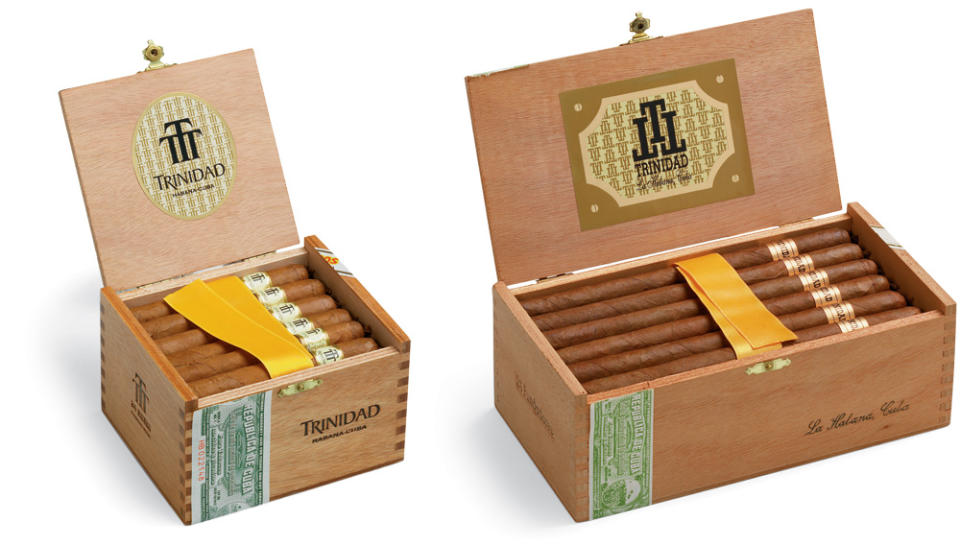
The Trinidad brand, with its hallmark pigtailed cap, premiered in 1996 as Fidel Castro’s VIP cigar to supplant the Cohiba, which began being publicly sold in 1982. Today the medium-full-flavored Trinidad remains Havana’s top-of-the-line, although their scarcity practically make them a “ghost” cigar. You’ll most likely pay a premium if you do score some.
Cohiba
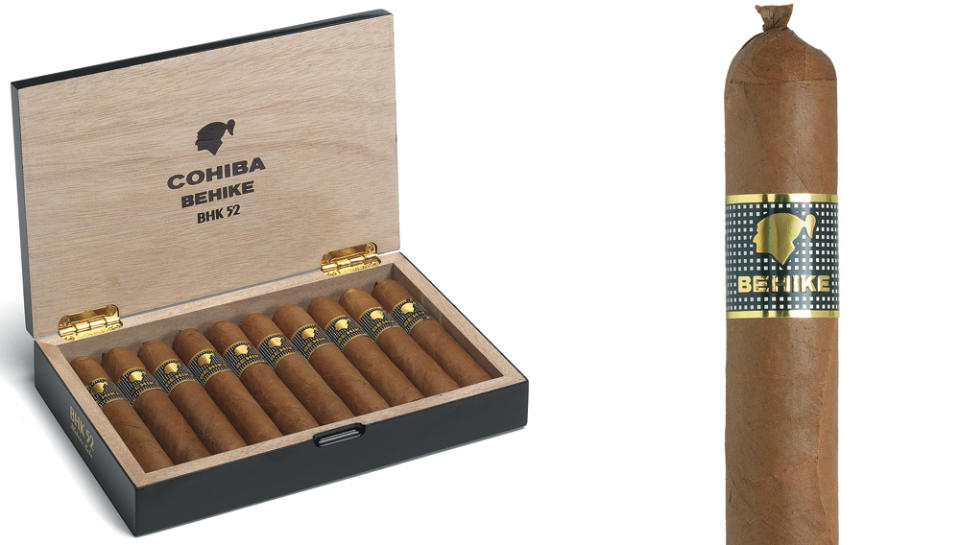
This is still one of the most widely counterfeited cigars in the world, so only purchase Cohibas from reliable sources. The full-powered, large-ringed Behike is a high-priced smoke worth paying for, simply for bragging rights, with its 54 and 56 ring gauges, but it is practically non-existent nowadays. Another rarity is the Cohiba Robusto Reserva, and while we usually don’t quote prices because of the fluctuating market for Cuban cigars, it’s safe to say these will normally run more than $100 a stick. Using the best of three-year-old tobaccos, it is available in just one size: a 4 7/8 x 50 Robusto. Only 500 individually numbered boxes were released. For something milder (and noticeably less expensive) try the Siglo VI. And be on the lookout for the pig-tailed 5 7/8 x 57 Cohiba 55 Aniversario Edición Limitada, a much-anticipated limited edition that should have come out in 2021 but is finally rumored to make its appearance sometime soon. Again, be prepared to pay a premium.
Montecristo
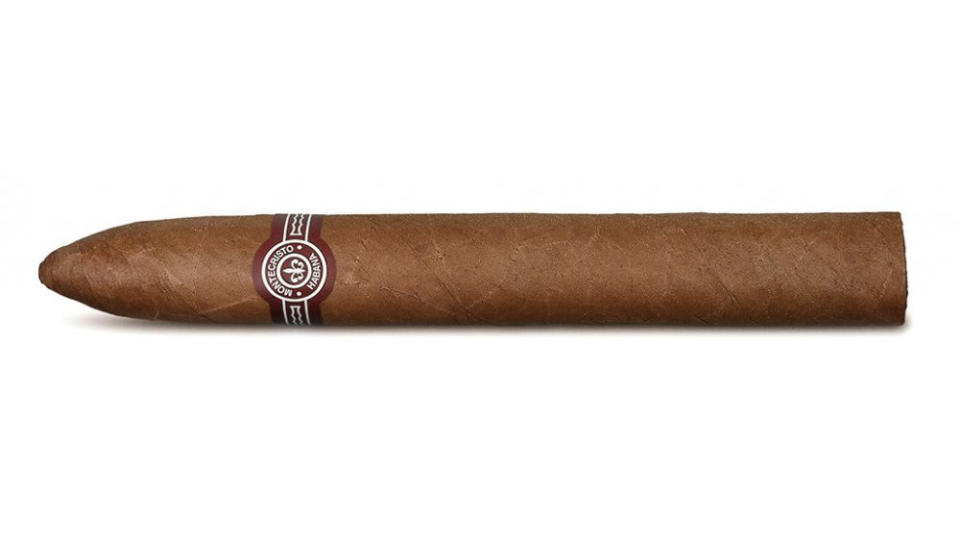
Although we’ve had some legitimate Montecristo cigars that were too tightly rolled in the past, this still remains one of our all-time favorites, due to its rich, medium strength flavor. We tend to gravitate to the No. 2 Pirámide, as it’s a very difficult shape to counterfeit, but you’re more likely to find the smaller No. 4, a 42 x 5 1/8 petit corona, one of the best selling cigars in the world. One anticipated cigar we haven’t seen so far is the 4 7/8 by 54 Wide Edmundo, which was supposed to have been released in 2021.
Partagás
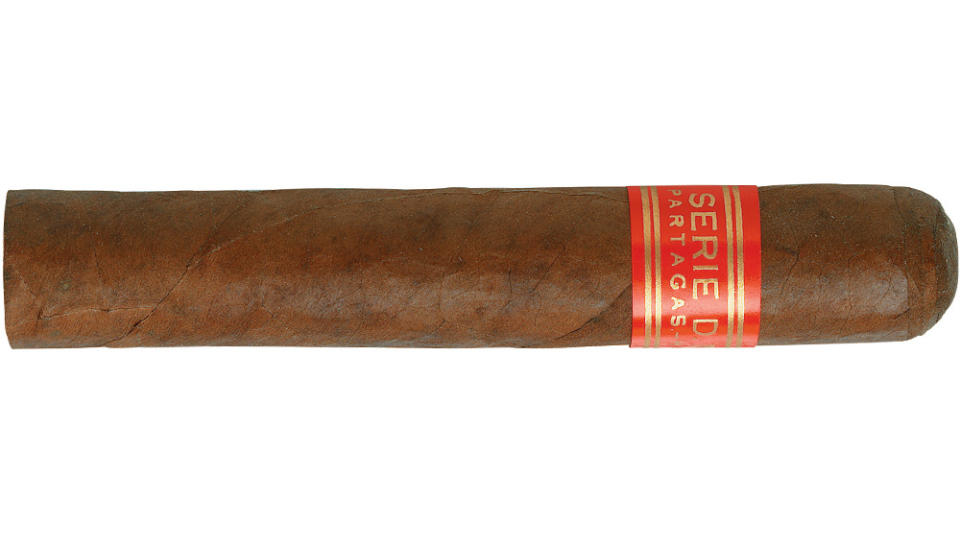
This is a porterhouse steak and Napa Cabernet smoke, in any size. In addition to the popular but now-scarce Serie D No.4 Robusto (the slightly shorter Serie D No.5 may be easier to find), another favorite of ours is the 6 ¼ x 47 Presidente figurado, with its easy-to-light pinched foot and easy-to-clip Perfecto cap.
Romeo y Julieta
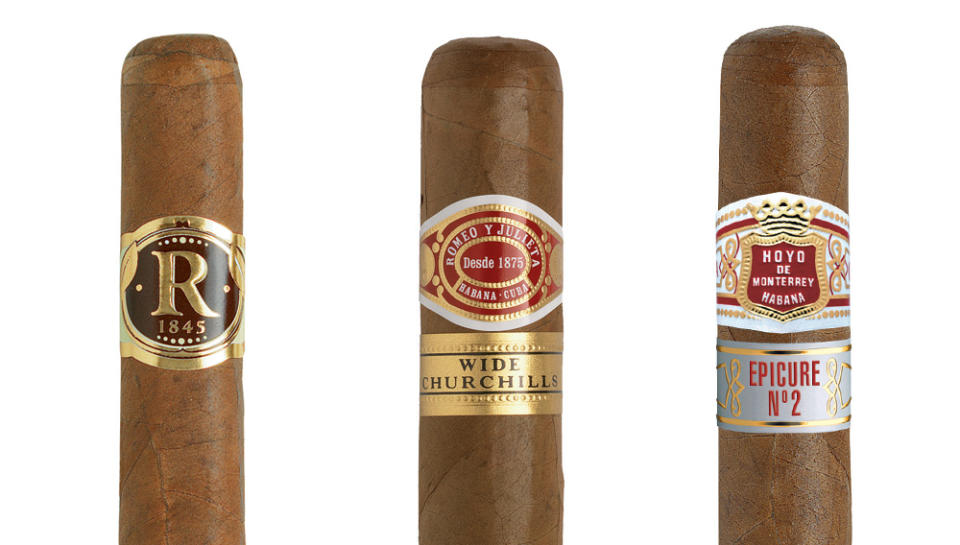
This is another cigar that never disappoints, especially for those in between times when you’re not quite sure what to smoke. It’s ideally suited for either a Gray Whale or Sipsmith Gin Martini (extra dry, olive on the side) or a Macallan 15 Years Old Double Cask. We’ve recently switched from the Short Churchill to the bigger-ringed 5 ¼ x 55 Wide Churchill Robusto. Besides offering a slightly fuller flavor, it seems to be more physically fitting to the shapes’ namesake.
H. Upmann
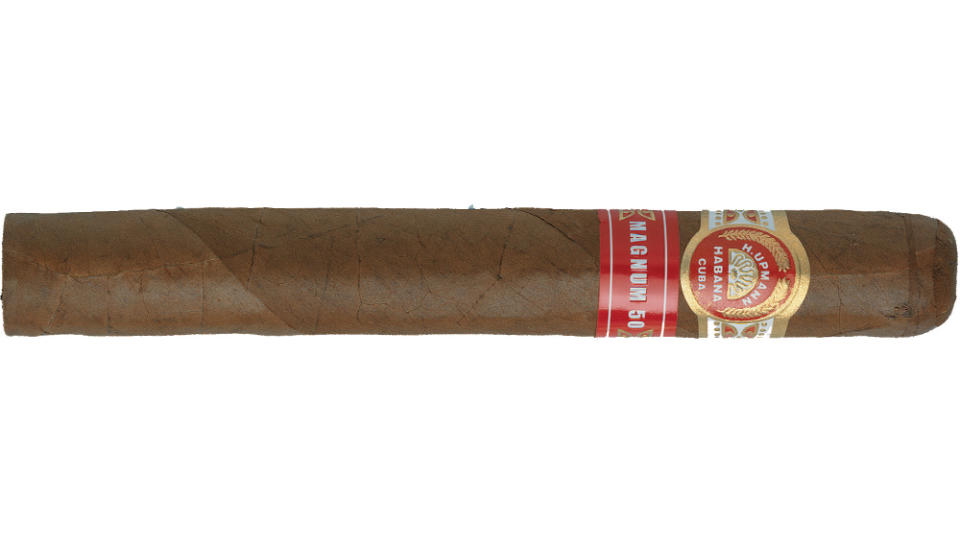
Another great medium strength cigar, this gentle smoke retains just enough earthiness to make it suitable for early afternoons to late evenings. Habanos S.A. was starting to increase its production and distribution with special releases just before the pandemic hit, but you may still be able to find many of the older sizes of H. Upmann at Casa del Habano shops.
Hoyo de Monterrey
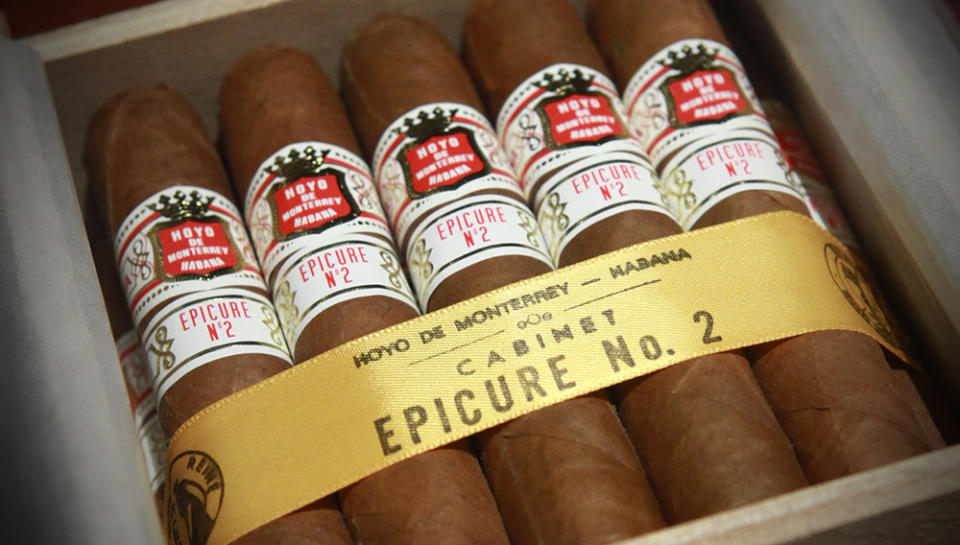
Don’t fall into the popular preconception that all Cuban cigars are strong. This brand certainly isn’t, although its strength will vary by shape. Thinking about having an Irish whiskey and a cigar? Try a Powers Three Swallow or the slightly more complex Lost Irish paired with an Epicure Especial 5 x ½ Robusto.
Best of Robb Report
Why a Heritage Turkey Is the Best Thanksgiving Bird—and How to Get One
The 10 Best Wines to Pair With Steak, From Cabernet to Malbec
20 Stellar Wines Under $100—and 5 Secrets for How to Find Them
Sign up for Robb Report's Newsletter. For the latest news, follow us on Facebook, Twitter, and Instagram.

